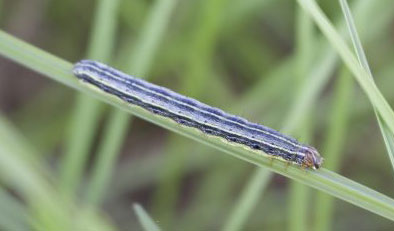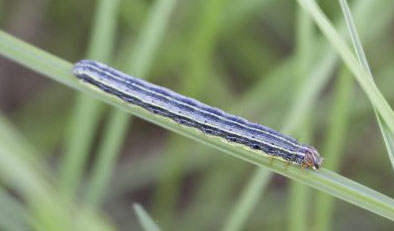Heat and dry weather conditions make this a peak time for insect pressure. Ayanava Majumdar, an Auburn Extension Professor in Entomology and Plant Pathology, cautions fall vegetable growers about insect pests and to scout regularly.

“Insects love the heat because they grow through their life cycle faster because of the extra heat. They grow faster. They mate and reproduce faster plus the plants are stressed. It’s like a perfect storm and it leads to massive crop losses for farmers,” Majumdar said.
Armyworms
There are various insect pests the growers need to be mindful of this time of year. Majumdar is concerned with caterpillars, in particular, the armyworm sisters: beet armyworm, fall armyworm, yellow striped armyworm and southern armyworm.
“These four, often times there’s mixed populations in the field. They can be very difficult to identify when they’re small. As they grow bigger it’s easier to identify. Those armyworms have very distinct patterns and head structures,” Majumdar said. “Those armyworms, along with horned worms, loopers; everything is just exploding right now. This is the peak of insect activity now.; August and then into September, to some extent. We are constantly telling farmers to watch; caterpillars on tomatoes and then you will see sucking insect pests, which cause quality loss like stink bugs, leaf footed bugs.
“Often, it’s hard to tell the yield loss from just the weight of the produce, but they will destroy the appearance or the taste of the produce. There’s a huge quality loss with the sucking insect pests. Those are increasing as well.”
Squash Bugs
He also warns of squash bugs on squash. They feed on the crop and can transmit yellow vine disease. This can shut down plants during harvest and is exacerbated by the current drought-like conditions.
While scouting is important, knowing when to apply insecticides can be just as key to pest management. Majumdar implores farmers to always consider the current weather conditions.
“We can not do calendar-based spraying anymore, at least not in Alabama. We go from drought to extreme wet weather in a week. That has a huge effect on insects,” Majumdar said. “Have some flexibility in the IPM plan. That’s very important to check the weather patterns. I’ve described flash drought versus prolonged drought. There’s different kinds of drought we’re experiencing now. That affects our pest management.”










